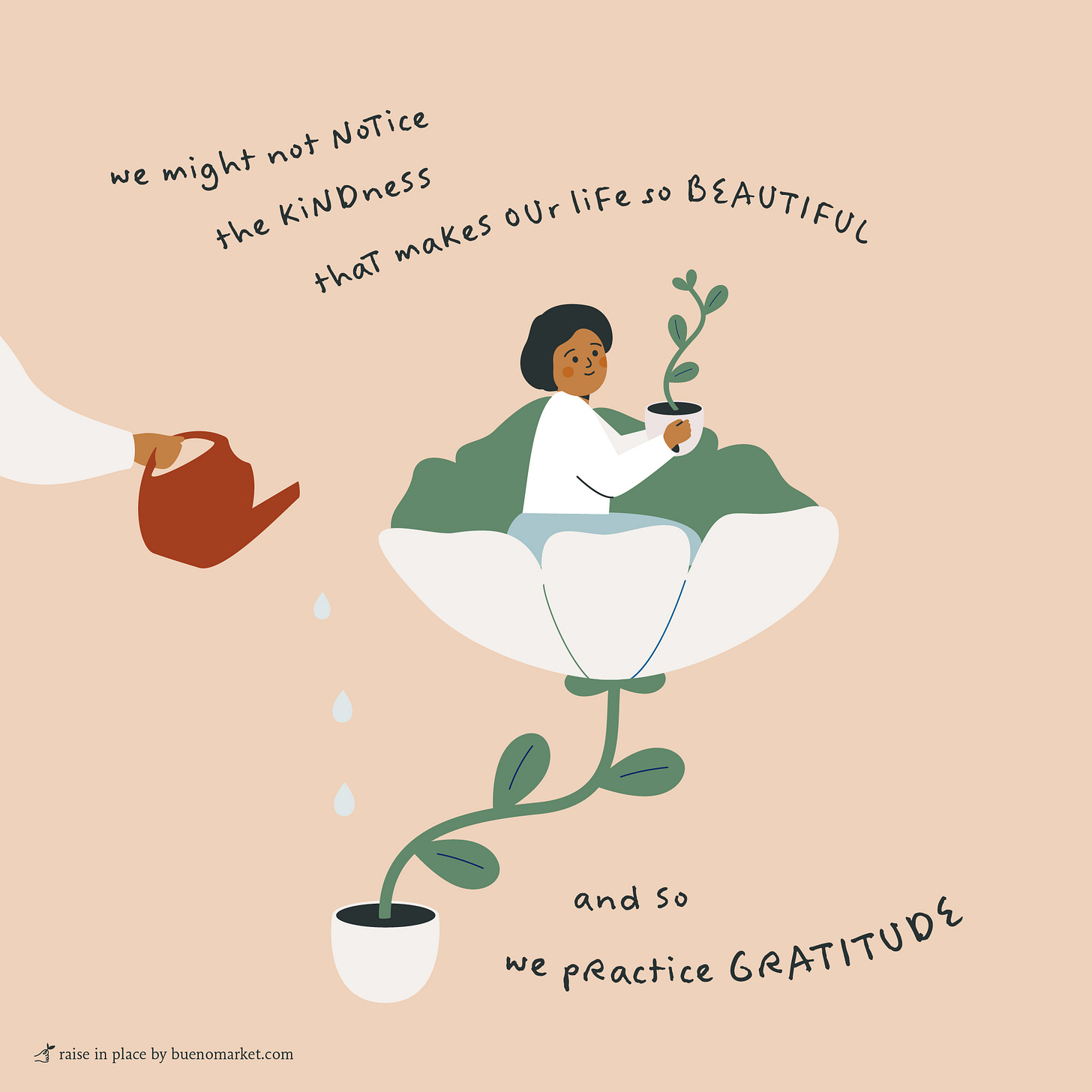Her worried brow relaxes into a gentle smile as 8-year-old Isla’s outstretched hands receive the clothes I have washed and folded in preparation for her first day of outdoor summer camp.
“This is exactly what I was looking for Mom.”
“And making sure you have clean adventure clothes ready for camp is one of the ways I show you that I love you Isla”, I respond with an understanding smile and soft eyes.
She drops the clothes on her bed to give me a big bear hug, nearly putting me off balance.
Illustration: A child holds a beautiful plant they’ve nurtured with kindness while sitting in a flower, without noticing the kindness of a parent watering the flower they are sitting in. Text: “We might not always notice the kindness that makes our life so beautiful and so we practice gratitude.” By Erika Fraser at BUENOMARKET.COM
The simple phrase “And this is one of the ways I show you that I love you” is a new addition to our family gratitude practice.
I sneak it at the end of mundane and grandiose moments equally, labelling actions as “loving and kind”. I assign it to moments between siblings, between Nate and I, and extend it to special moments with close family and friends.
In a busy family household, simple gestures of kindness can go unnoticed;
A clothing item left on the floor and placed into the hamper by a sibling.
A dish cleared from the table by Mom.
An item returned in good condition by a friend.
The daily emptying of the dishwasher by Dad.
The big ones are rarely missed, but they too might a nudge in acknowledgement;
A well-planned birthday party with contributions from the whole family.
The time grandparents took to prepare a sleepover space for when our little ones visit.
A friend who drops off flowers or calls to chat after a hard day.
“…And that is one of the ways they show you that they love you”.
Inspired by Buddhist meditation that calls on you to thank each of your body parts for performing their functions for the day, or Marie Kondo’s practice of thanking daily items as they get put back into their place, gratitude practice calls us back to the 2 of the most frequently used words in any language; “Thank you”.
This practice plays into the psychology of our awareness. Returning to the Baader-Meinhof phenomenon, we can count on this cognitive bias to increase our perception of the frequency of acts of love and kindness. By framing these simple thoughtful and kind gestures in a category of “love”, we are more likely to notice similar acts and label them accordingly.
Yuval Harari’s book Sapiens: A brief history of Humankind is centred around human myth-making. Our ability to use imagination and language to create new worlds, alternatives, and possibilities. Through the lens of myths, or stories we come to believe has come tribes, culture, currency, and corporations. As meaning-making machines, it seems almost too simple to wrap ourselves up in love and kindness and teach our children to do the same.
And while we so readily accept the stories of cultural norms, citizenship, and of 40-hour work weeks, humanity is still seeking a universally accepted story for kindness and love above all else.
Leo Tolstoy once wrote, "Nothing makes our lives, or the lives of other people, more beautiful than perpetual kindness,".
So in an act of radical intentionality from me to you, sending this to you is just one of the ways that I show you that I love you.
P.S. If you’d like to create a world of gratitude and kindness as you support a little person in your life go from diapers to a potty, consider joining my newly launched program The Diaper Free Summer over at Bueno Market.
Have a friend who would enjoy learning more about naturally going diaper free and joining a group of families making the leap together this summer? Be a lovely friend and send them a note to let them know they should be joining us :)
Want to peak inside the program? Watch the replay of our first workshop >






